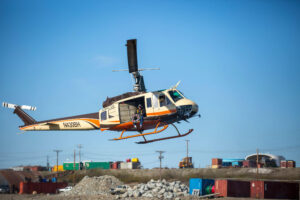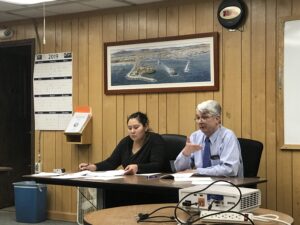This article by Ben Matheson was originally published by Alaska Public Media. It was republished with permission through a partnership with KNOM.
Rookie Hunter Keefe needed a second to breathe in Shageluk Friday morning after his 55-mile overnight run in from Iditarod.
Cold overnight temperatures froze the softened trail into what Keefe called a bobsled track. He crashed his sled multiple times.
“It was extremely narrow and winding and going up and down very steep pitches,” he said. “You would try to drive your sled to dodge the trees, but the sled wouldn’t drive, so I was hitting trees with my sled, hitting trees with myself.”
He tore a hole in his new jacket and was inspecting his sled for damage in between feeding his dogs thawed meat snacks during his eight-hour rest at the Shageluk checkpoint, about 500 miles into the 1,000-mile race.
“You think you can drive a sled and then it’s weird when you try to drive it and it doesn’t drive at all. You think the sled is broken, but really it’s just the trail condition,” said Keefe.

Keefe and other mushers throughout the course of the day decided to park their sled dog teams in Shageluk Friday for a rest after the challenging run. Mushers chatted in the quiet checkpoint about the upcoming Yukon River segments and enjoyed the bright cold day.
Between here and Kaltag, each team is required to rest for one continuous eight-hour block. Shageluk’s compact checkpoint provides perks like hot water on demand which saves time compared to melting snow like they did in the remote Iditarod checkpoint on Thursday.
Keefe is in the running for Rookie of the Year honors — an award for the highest-placing rookie. Eddie Burke Jr. is also a contender. He was finishing up his eight-hour break and looking over the team one final time.

Some of his dogs were struggling with a stomach bug, but Burke was happy that they were eating a lot, something that matters when colder weather amps up his team’s calorie needs.
“Appetites are through the roof right now, they’re doing really well with the eating,” said Burke. “And they’re going to like the cooler temps a lot more than 30 or 40 degrees.”
Dan Kaduce carried a dog in this sled for a few hours on the bumpy run over, which he said was like being in a pinball machine.
“We’d had so much bumpy and hard on the joints of the dogs type trail coming into here, that they could really use a nice flat trail for a couple runs to get feeling good again,” said Kaduce.

He thinks his one sore dog that he carried will be able to continue after a good break in Shageluk. But after a fourth place finish last year, he’s recast his ambitions for the rest of the race.
“I am just hoping to make it. I don’t have any delusions of racing hard,” said Kaduce. “I just want to see some tails wagging the rest of the way.“
Image at top: Rookie Hunter Keefe feeds his team in Shageluk on Friday. (Ben Matheson/Alaska Public Media)





